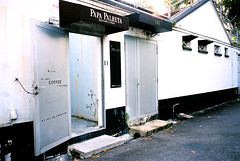Coffee, Salt and Light, and the Essence and Use of the Christian (Matthew 5:13-16)
Buoyed by great waves of enthusiasm, we stopped at Papa Palheta for a refuel between bible study and dinner that night. The Terra Firma blend was indeed bootylicious, complex with long palate, as advertised, unfairly disadvantaging the Sulawesi Today, Tomorrow, Toraja that came after.
A bag of Terra Firma, ground on the spot with the dial at 5.5, for the stovetop, was delicious stuff; a beacon of light amongst the soured drainwater of big chain coffeehouses. The steady stream of caffeine fiends even without any real attempt at publicity bore testimony. It did not hurt that onsite, there were, outside: wooden benches and black metal chairs and tables and fluffball kittens who stalked you until you acquiesced and rubbed their little soft tummies; and inside: comfy sofas and vintage fittings and friendly fellow-imbibers who educated you that poker was now the game of choice amongst males of a certain set. Should have known eh, Lady Gaga.
There is much talk nowadays, post-9/11, post-AWARE saga, of the role of Christians in society. Jesus' take is:
You are the salt of the earth, but if salt has lost its taste, how shall its saltiness be restored? It is no longer good for anything except to be thrown out and trampled under people's feet.Much ink has been squirted, squid-like, on the subject of salt: ah, Christians as salt act as preservatives, preventing putrification and decay, keeping morals untouched in this rotten world; or Christians are the antiseptic to the infective germs of the evil in this world; or Christians purify the world because wasn't that the use of salt in the Old Testament?; or Christians are valuable because in ancient times, salt was used as currency etc.
You are the light of the world. A city set on a hill cannot be hidden. Nor do people light a lamp and put it under a basket, but on a stand, and it gives light to all in the house. In the same way, let your light shine before others, so that they may see your good works and give glory to your Father who is in heaven. (Matthew 5:13-16)
But the user of a metaphor usually employs it with a certain characteristic in mind. And Jesus seems less concerned by the specific uses of salt than the need for salt to retain its essence - the saltiness that makes it salt (Matthew 5:13).
This is a warning then to Christians that if they do not retain their essence of being Christians, they will be useless for anything and be thrown out of the kingdom (Matthew 5:13). And what is the Christian to be used for? Jesus says that Christians are meant to be the light of the world, shining before others so that others may see their good works and give glory to God the Father who is in heaven (Matthew 5:14-16).
What is the essence of a Christian then? If you boil him down to his core, what is the distinctive residue you are meant to find sticking to the pot? Perhaps contrary to popular belief, a Christian is not defined by the Nobel Peace Prize-worthy mercy relief of Mother Teresa, the early political agitation for human rights by William Wilberforce, or lobby groups that ensure that conservative morals continue to be upheld by the law of the land. Healing the sick, relieving the suffering of the poor and oppressed and abused, preserving God's design in the world are, in their fashion, good things. But there are many voluntary welfare organisations who too hold to "conservative" value and are also concerned with the poor, the sick, the needy (and also the animals and Mother Earth). While these may be (necessary) outworkings of the Christian's distinctiveness and are sometimes highly commended in the world, they cannot be his primary priority in life nor do they make him the salt of the earth and the light of the world.
The essence of the Christian is found in Matthew 5:3-11: considering his failure to obey God makes him poor in spirit; he mourns for his sin; because he is aware of where he stands before God, he is meek; he hungers and thirsts for a right relationship with God, and because he trusts with his whole being that God has gracefully and mercifully dealt with his sin as God himself has promised, the Christian is himself merciful to others; he lives a God-centred life and works to bring others to a peaceful, right relationship with God. These are the true good works that will bring others to glorify God on the last day, though they may persecute the Christian in the meantime! (Matthew 5:10-11)
As the light of the world, God's use for the Christian is as a good influence, someone who has a positive impact on others (whether they think so or not). The Christian can be a light only if he is salty. While aid organisations and moral crusades may help plaster over the consequences of the global problem of sin, they do not even bother to warn others that they are mired in sin, much less tell anyone how to get out of the mess they're in. In fact, they mostly ignore God and his purposes altogether, advocating instead the self-sufficiency of man in dealing with his own problems and those of his neighbours. But as the rest of the Sermon on the Mount (Matthew 5:17ff) shows, Jesus is the only one who can deal with the root problem of sin and stave off its dire consequences. If a Christian is in his essence authentically Christian, he will and must point others to the only way they can be saved from the wrath of God in his coming judgement for that is God's purpose for him in the world. And already, there is the implication of final judgement in the Sermon on the Mount: there will be a time of reckoning - useless salt that has lost its saltiness will be thrown out; Christians who do nothing to cause others to give glory to the Father by telling them about his son will be summarily ejected from his kingdom.
The house is burning to the ground. If our primary concern is the adverse effect of the rise in house temperatures on the electricity bill (the air-conditioning will have to work harder) or the threatened extinction of the rare species of aspidistra on the window sill or winning lengthy discussions on the complementary of decorative wall-painting techniques and lose our lives in the imminent destruction of the abode, do we really believe that destruction is at hand and that we, together with all the occupants of the house, are in imminent danger of a terrible fiery end? If we truly understand our position and truly trust in the only (and rather narrow) escape route, the treatment of smoke inhalation might be of some importance but we would find the even more pressing issue to be the evacuation of housemates to a place of safety and be saved ourselves as well.
A Trundle Through Sermon on the Mount
Earth Moves Under Feet, Kingdom Comes (Matthew 5-7)
This is the Sound of Inevitability (Matthew 5:1-6)
Breeding - We Hazs It (Matthew 5:7-12)
Coffee, Salt and Light, and the Essence and Use of the Christian (Matthew 5:13-16)
And the Missing Link is Jesus (Matthew 5:17-20)
Perfect Laws for Perfect Relationships (Matthew 5:21-48)
Cakes for Kierkegaard and Sermon on the Mount as Existentialist Answer Perhaps (Matthew 6:1-18)
Papa Palheta
140 Bukit Timah Road, off Hooper Road
Tel: +65-9799 0420 (Leon Foo)
Labels: *Matthew, *Matthew: Sermon on the Mount, All Given For Food: Coffee, All Given For Food: Cupcakes















0 Comments:
Post a Comment
Subscribe to Post Comments [Atom]
<< Home